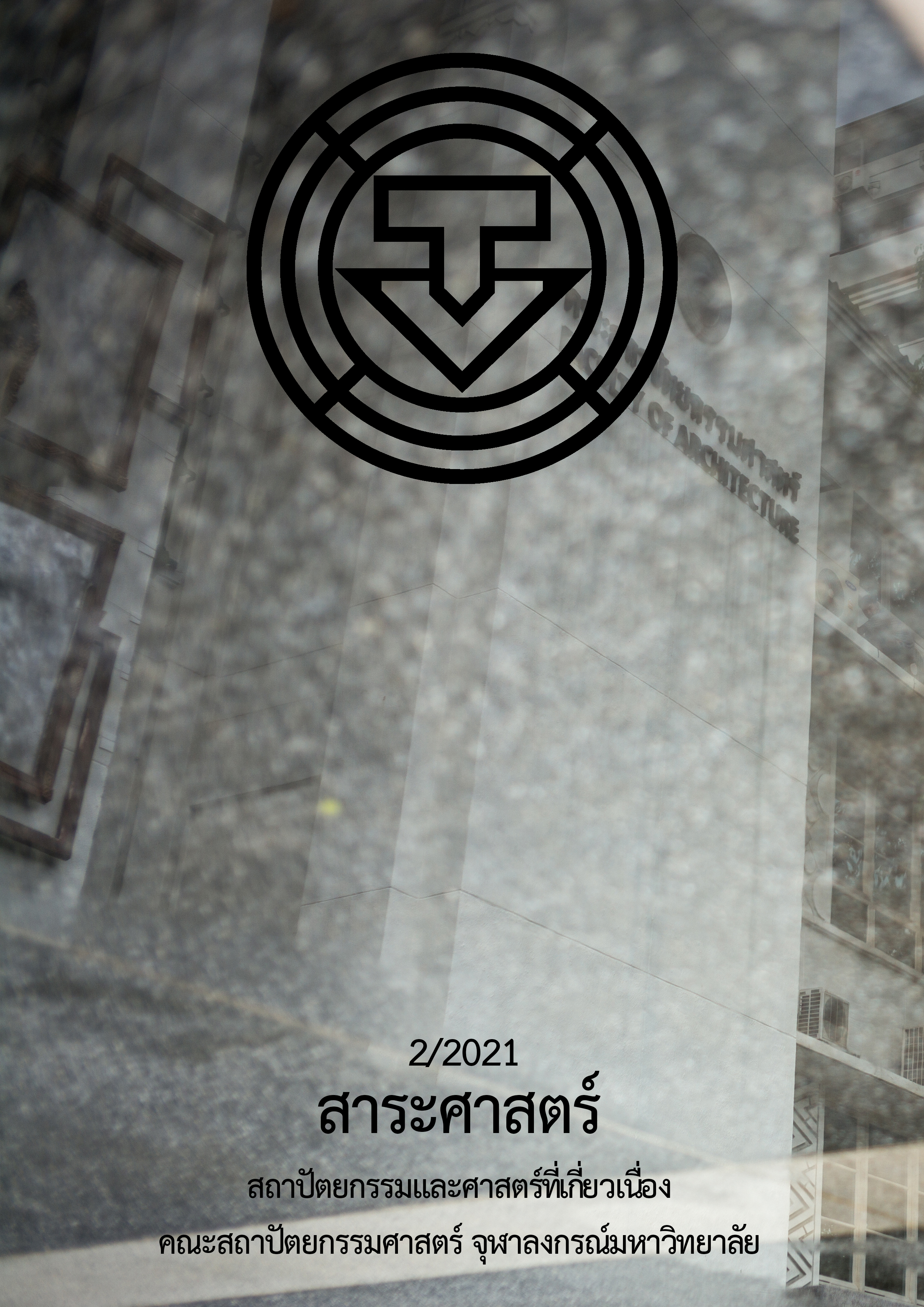ทัศนคติของผู้หญิงโสดอายุตั้งแต่ 30 ปีขึ้นไปต่อการอยู่อาศัยในคอนโดมิเนียม ในเขตกรุงเทพมหานครและปริมณฑล
Main Article Content
บทคัดย่อ
ปัจจุบันผู้หญิงโสดมีจำนวนและแนวโน้มเพิ่มขึ้นอย่างต่อเนื่อง และนิยมอาศัยในคอนโดมิเนียม จากงานวิจัยส่วนใหญ่ที่ผ่านมายังขาดการศึกษาถึงเรื่องที่อยู่อาศัยซึ่งถือเป็นเรื่องที่สำคัญ ดังนั้น งานวิจัยนี้มีวัตถุประสงค์เพื่อศึกษาลักษณะการอยู่อาศัยในคอนโดมิเนียม ความพึงพอใจและปัญหาในการอยู่อาศัย โดยสอบถามจากกลุ่มผู้หญิงโสดที่อาศัยอยู่ตามลำพังในคอนโดมิเนียมในเขตกรุงเทพมหานครและปริมณฑลจำนวน 1,143 คน
ผลการศึกษาพบว่า 1) กลุ่มตัวอย่างผู้หญิงโสดส่วนใหญ่อายุ 30 - 39 ปี และเมื่อพิจารณาตามลักษณะงานอดิเรก พบว่าแบ่งได้เป็น 4 กลุ่มคือ กลุ่มผู้หญิงโสดนักเดินทาง กลุ่มผู้หญิงโสดเต็มที่กับชีวิต กลุ่มผู้หญิงโสดออนไลน์ และผู้หญิงโสดชีวิตเรียบง่าย ทั้งนี้ กลุ่มผู้หญิงโสดส่วนใหญ่จบการศึกษาระดับปริญญาตรี ทำงานประจำในภาคเอกชนและรัฐ และมีรายได้ประมาณ 50,001 - 70,000 บาทต่อเดือน 2) คอนโดมิเนียมที่อาศัยมีลักษณะสำคัญคือ ขนาดเฉลี่ย 31 - 35 ตร.ม. โดยที่ปัจจัยหลักในการเลือกคอนโดมิเนียม คือทัศนียภาพ ทำเลที่ตั้งใกล้สถานีรถไฟฟ้าและที่ทำงาน และความปลอดภัย ทั้งนี้ ส่วนใหญ่ร้อยละ 59.4 นิยมเช่ามากกว่าซื้อ 3) ผู้หญิงโสดเกินครึ่งพอใจต่อการอยู่อาศัยในระดับมาก จากปัจจัยความปลอดภัยและความผ่อนคลาย และส่วนใหญ่มีความเหงาในการอยู่อาศัยเป็นครั้งคราว ซึ่งมีแนวโน้มลดลงเมื่ออายุเพิ่มขึ้น อีกทั้งปัจจัยความเหงาจะส่งผลกระทบต่อการใช้งานพื้นที่ 4) กว่าครึ่งของผู้หญิงโสดอาศัยในคอนโดมิเนียมทุกวัน โดยกลุ่มผู้มีอายุมากมีการใช้พื้นที่ภายในมากกว่าอายุน้อย ทั้งระยะเวลาการอยู่อาศัยในวันหยุด การสังสรรค์ และการใช้พื้นที่นันทนาการ 5) ปัญหาที่พบเมื่ออาศัยอยู่ตามลำพัง คือการซ่อมแซม การขนของ และการเจ็บป่วยเป็นหลัก โดยเฉพาะในกลุ่มอายุมาก
ผลการศึกษาชี้ให้เห็นว่าผู้หญิงโสดส่วนใหญ่มีทัศนคติดีต่อการอยู่อาศัยในคอนโดมิเนียมจากปัจจัยความสะดวกสบายและความปลอดภัย อย่างไรก็ตามข้อเสนอแนะต่อผู้ประกอบการ ด้านกายภาพควรจัดพื้นที่สังสรรค์มากขึ้น เช่น ห้องสันทนาการ ครัวรวม เป็นต้น เพื่อลดความเหงาในการอยู่อาศัยที่มีสูงในกลุ่มอายุน้อย หรือเพิ่มพื้นที่ผ่อนคลาย เช่น สวน ห้องซาวน่า สำหรับกลุ่มอายุมากที่มีการใช้งานพื้นที่เหล่านี้เพิ่มขึ้น อีกทั้งควรจัดให้มีบริการช่วยเหลือเพื่อแก้ปัญหาในการอยู่ตามลำพัง เช่น รถเข็นขนของ ปุ่มขอความช่วยเหลือ เป็นต้น เพื่อให้ตอบรับการอยู่อาศัยที่มีคุณภาพของผู้หญิงโสดให้ได้มากที่สุด
Article Details
เอกสารอ้างอิง
กมลลักษณ์ โชติจิตรวิเชียร. (2561). รูปแบบการดำเนินชีวิตที่มีความสุขของคนโสดในกรุงเทพมหานคร. (วิทยานิพนธ์ปริญญามหาบัณฑิต, มหาวิทยาลัยรามคำแหง).
กัลยา วานิชย์บัญชา. (2549). สถิติสำหรับงานวิจัย (พิมพ์ครั้งที่ 2). กรุงเทพมหานคร: สำนักพิมพ์จุฬาลงกรณ์มหาวิทยาลัย.
กุญช์วรรณ นิดรกูล. (2552). ทัศนคติต่อการอยู่เป็นโสดของสตรีในเขตกรุงเทพมหานคร. (วิทยานิพนธ์ปริญญามหาบัณฑิต,จุฬาลงกรณ์มหาวิทยาลัย).
ชลลดา วาดนิ่ม. (2553). ปัจจัยที่เกี่ยวข้องกับความสุขของสตรีโสดในเขตกรุงเทพมหานคร. (สารนิพนธ์ปริญญามหาบัณฑิต, มหาวิทยาลัยศรีนครินทรวิโรฒ).
ชัญญา ลี้ศัตรูพ่าย. (2546). ความเครียดในการอยู่เป็นโสดของสตรีอายุ 30 ปีขึ้นไปในหน่วยงานรัฐ รัฐวิสาหกิจ และเอกชน เขตกรุงเทพมหานคร. (สารนิพนธ์ปริญญามหาบัณฑิต, มหาวิทยาลัยศรีนครินทรวิโรฒ).
ทิพวรรณ ศิริสัมพันธ์, สิริรัฐ หนูสี และ ณัฐชนัน ฐิติพันธ์รังสฤต. (2562, กรกฎาคม). การครองโสดของผู้หญิงในยุคโลกาภิวัตน์ กับเศรษฐกิจในเมืองไทย. วารสารธรรมศาสตร์, 38(3), 27-44.
ธนาคารไทยพาณิชย์. ศูนย์วิจัยเศรษฐกิจและธุรกิจ. EIC Data Infographic: #โสดFeelGood. สืบค้นเมื่อ 22 กุมภาพันธ์ 2563, จาก https://www.scbeic.com/th/detail/product/6102
ธนิณี บัณฑิตวัฒนาวงศ์. (2556). รูปแบบการดำเนินชีวิต พฤติกรรมการบริโภค และการเปิดรับสื่อของผู้หญิงโสดในกรุงเทพมหานคร. (วิทยานิพนธ์ปริญญามหาบัณฑิต, จุฬาลงกรณ์มหาวิทยาลัย).
ธันยุดา บูรณวุฒิ. (2553). ความสุขของผู้หญิงโสด อายุ 35 ปีขึ้นไป. (วิทยานิพนธ์ปริญญามหาบัณฑิต, จุฬาลงกรณ์ มหาวิทยาลัย).
ปริญญา อยู่เป็นแก้ว. (2552). การตัดสินใจอยู่เป็นโสดของผูหญิงในยุคโลกาภิวัตน์. (วิทยานิพนธ์ปริญญามหาบัณฑิต, มหาวิทยาลัยธรรมศาสตร์).
ศศิวิมล วรุณศิริ. (2563). ทำไมน้องไม่แต่งงาน? ผลกระทบของการศึกษาต่อการตัดสินใจแต่งงานและมีลูกของผู้หญิงไทย. สืบค้นเมื่อ 18 มีนาคม 2563, จาก https://www.pier.or.th/?abridged=ทำไมน้องไม่แต่งงาน-ผลกร
ศุทธิดา ชวนวัน และ ปิยวัฒน์ เกตุวงศา. (2557). ทำไมผู้หญิงไม่แต่งงาน: ผู้ชายหายไปไหน? การเกิดกับความมั่นคงในประชากรและสังคม. นครปฐม: สำนักพิมพ์มหาวิทยาลัยมหิดล.
สัมมา คีตสิน. (2555, 20 พฤศจิกายน). ไมโครคอนโด. โพสต์ทูเดย์, น.9.
Drew, R. B. (2006). Buying for themselves: An analysis of unmarried female home buyers. Belmont, MA: Joint Center for Housing Studies Harvard University.
Lang, M. (2002, April 29-30). The use of web-based international surveys in information systems research. In Remenyi, D. (ed). Proceedings of European Conference on Research Methodology for Business and Management. (p. 187-196). Reading, England.
Yui, Y. (2006). Purchases of condominiums by single women and their background: Housing problems for women. Geographical Review of Japan, 79(12), 629-643.


